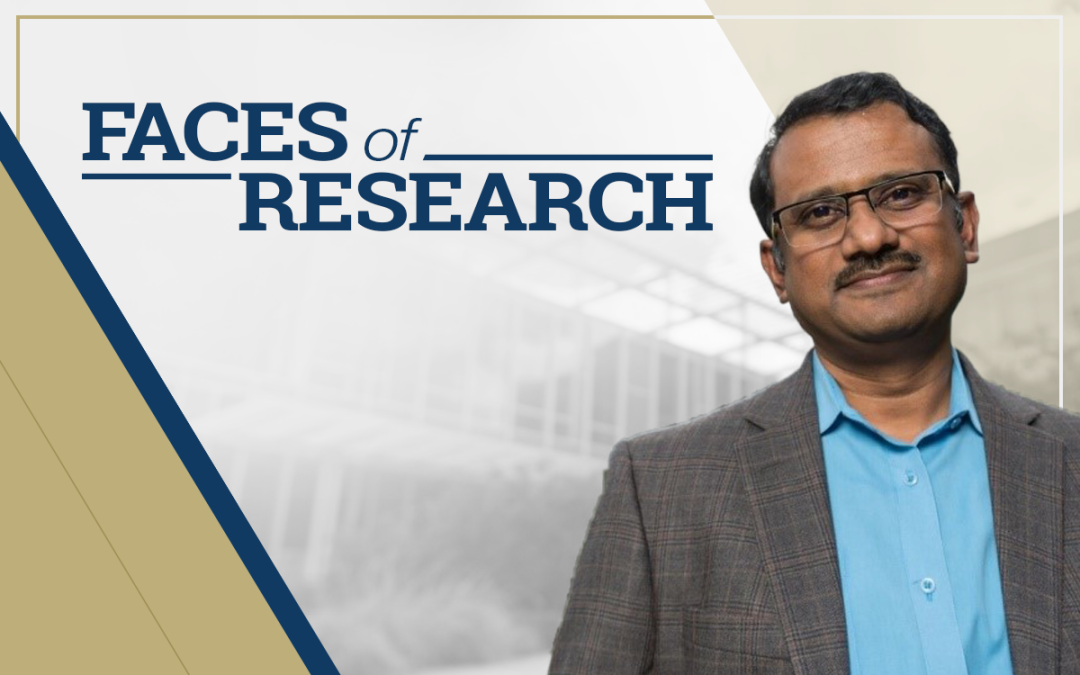Krishnendu (Krish) Roy, director of the National Science Foundation Engineering Research Center for Cell Manufacturing Technologies, researcher in two Georgia Tech interdisciplinary research institutes, and the Robert A. Milton Endowed Chair at the Wallace H. Coulter Department of Biomedical Engineering.
Meet Krishnendu (Krish) Roy, director of the National Science Foundation (NSF) Engineering Research Center for Cell Manufacturing Technologies (CMaT) and Marcus Center for Cell Characterization and Manufacturing, researcher in two interdisciplinary research institutes (IRIs) at Georgia Tech — the Institute for Bioengineering and Bioscience and the Institute of Electronics and Nanotechnology — and Robert A. Milton Endowed Chair at the Wallace H. Coulter Department of Biomedical Engineering at Emory University and Georgia Tech.
What is your field of expertise and why did you choose it?
My lab’s work is in the emerging field of immunoengineering, which uses engineering principles and tools to understand our immune system in health and diseases and develop new therapies and diagnostics to treat diseases by modulating and controlling the immune system. From an engineering perspective, we develop and use biomaterials and cellular engineering tools to solve biomedical problems. I come from a family of physicians, but I studied electrical engineering and instrumentation as an undergraduate. When I moved to the U.S., I became interested in biomedical engineering and gradually moved into more molecular and materials engineering. My love for immunology came during my Ph.D. at Johns Hopkins. Our immune system is a fascinating control system, with amazing redundancies and feedback control, which as an electrical engineer, is so awe-inspiring.
I feel fortunate to be able to work at this interface of biology, physiology, and engineering and hopefully help discover and develop tools to help patients. Beyond my lab, I lead a nine-university NSF Engineering Research Center for Cell Manufacturing Technologies and the Marcus Center for Cell Characterization and Manufacturing, which develops engineering and biomanufacturing tools for scalable and cost-effective manufacturing of therapeutic cells. This has direct implications for patients and healthcare, and I love that translational aspect of the work.
What makes Georgia Tech research institutes unique?
Georgia Tech has a unique model of research infrastructure that is hugely effective. The IRI structure allows consolidation of resources and makes collaboration across schools and colleges seamless. It naturally breaks down barriers. Labs and centers don’t need to duplicate staff and resource infrastructure and can focus on science. We work extensively with multiple IRIs in the centers that I lead and can leverage a tremendous ecosystem of intellect and resources. I particularly appreciate the core facilities. Many people do not realize how privileged we are at Georgia Tech to have such well-managed and extensive core facilities. Even though my NSF center spans nine institutions across the U.S. and four international institutions, the IRI structure enables us to manage it seamlessly.
What impact is your research having on the world?
My students and fellows in the lab are developing new therapies for cancer, infectious diseases, trauma, tuberculosis, and other devastating and incurable diseases. In addition, their work is enabling new understanding of disease pathology and unraveling how our immune system controls and influences disease initiation and progression. These technologies and the new knowledge generated directly impact our understanding of complex disorders and the development of new therapies. Our focus on scalable manufacturing adds another critical layer to these efforts — making sure that we have a path for translation to industry and to the clinic to help patients. Another major focus in my lab and the centers that I lead is on training the next generation of scientists and engineers. We work closely with high school students and teachers, technical college students and teachers, as well as undergraduates, to prepare them for emerging biotechnology research and industry. These research education and workforce training aspects, especially with our focus on underrepresented groups, are critically important for the future of science and engineering.
What do you like to do in your spare time when you are not working on your research or teaching?
I have a 4th grader. Spending time with her is the biggest priority in my free time. I also have a dog. Between my daughter and my dog — time flies. I also love traveling to new places around the world and tending to my vegetable garden. The pandemic has taken a toll on the first but has helped nurture the latter.
Meet other Faces of Research on the Georgia Tech Research News website.
Latest BME News
Jo honored for his impact on science and mentorship
The department rises to the top in biomedical engineering programs for undergraduate education.
Commercialization program in Coulter BME announces project teams who will receive support to get their research to market.
Courses in the Wallace H. Coulter Department of Biomedical Engineering are being reformatted to incorporate AI and machine learning so students are prepared for a data-driven biotech sector.
Influenced by her mother's journey in engineering, Sriya Surapaneni hopes to inspire other young women in the field.
Coulter BME Professor Earns Tenure, Eyes Future of Innovation in Health and Medicine
The grant will fund the development of cutting-edge technology that could detect colorectal cancer through a simple breath test
The surgical support device landed Coulter BME its 4th consecutive win for the College of Engineering competition.








